Alumnus Describes Poland Daily Volunteering Schedule as a “Rewarding and Enriching Experience”
Five-time Poland Volunteer Ken Higgins says working with the students at summer camps in Siedlce, Poland “has been one of the most rewarding and enriching” experiences of his life. Read on for his description of a typical day’s volunteering schedule in Poland.
By Ken Higgins
I have been blessed enough to be a volunteer at summer camp in Siedlce, Poland for five years. My experience at camp has been one of the most rewarding and enriching of my life. Each year has had different challenges, rewards, and learning experiences as different students bring with them their own unique skills and personalities. The group of volunteers changes from year to year. This, too, helps shape the camp. But that being said, there is a routine and rhythm to camp which is a part of what makes it so special. Here, I’d like to share a bit about what it is like to arrive at camp, participate in the summer camp with the students, and depart from beautiful Reymontówka.
The Poland Daily Volunteering Schedule
Welcome (On Arrival): The experience begins when the yellow bus shows up at the airport on Saturday afternoon to transport us off to camp in Siedlce, a rural area of Poland. The trip reunites volunteers from previous years and introduces all of us to new volunteers. As we make the 80 to 90-minute trip, we catch up and learn about each other. When we get off the main highway and travel on the country roads another mile or two to camp, it is good to see the gates and grounds of the manor house. So many memories of past camps fill my head. As is customary, waiting for us at the door along with the staff is Marek Blaszczyk, the Director of Reymontówka Manor House, with the typical Polish greeting. We all break a piece of bread from the loaf offered to us and dip it in the tray of salt. And so we begin.

Reymontówka is a beautiful 200-year-old restored manor house in Siedlce, Poland where volunteers lodge. 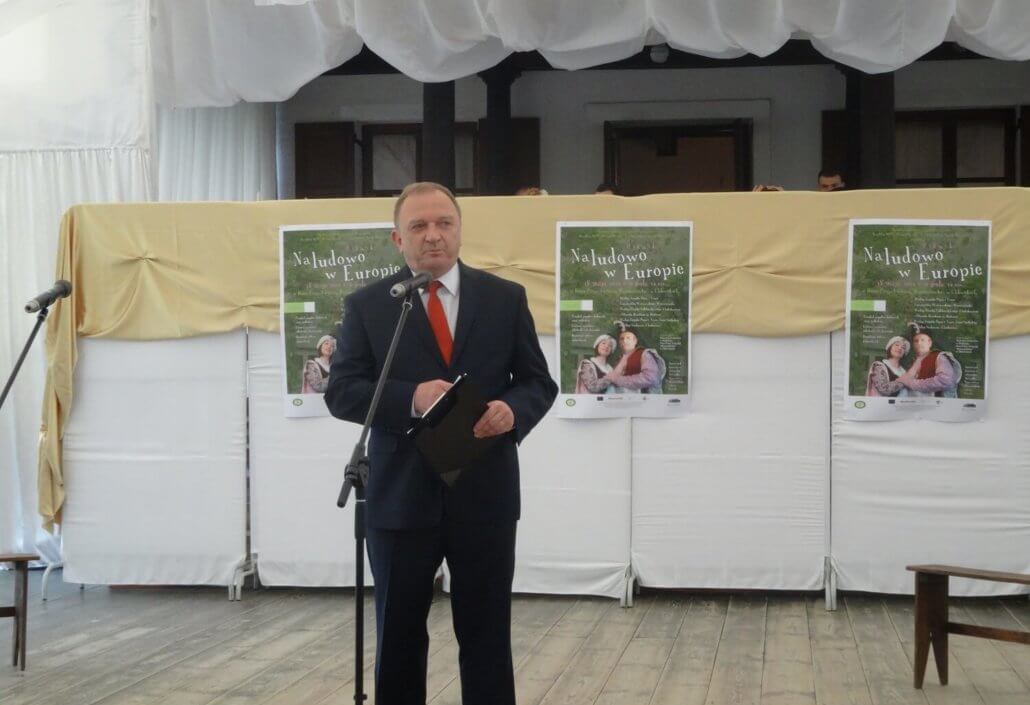
Marek Blaszczyk, the director of Reymontówka and Global Volunteers’ Poland host, is ever present during volunteers’ time at the manor house.
Orientation (First Day): There are no students at camp today. We will spend the day getting ourselves oriented and Dorota, our Team Leader, will lead a session helping us to establish team goals and how we want to work as a group. Of course we will have the first of many delicious meals prepared by our wonderful hosts. Tomorrow all the students will arrive. Dorota will assign us the students that will make up our class. We will have an opportunity to meet them briefly. These students over the next two weeks will challenge us, make us laugh, amaze us with their talent and eagerness to learn, and last, touch us in all kinds of ways we nor they can imagine.
Monday to Friday Schedule:
At camp I most often sleep with the window of my room open, enjoying the cool breeze during the night. I awaken at about 7:00 in the morning to the sounds of children outside either exercising with their PE instructor or playing a game of Ringo. The sounds of their laughter is always a good way to start the day. The aroma of breakfast being prepared downstairs drifts into my room.
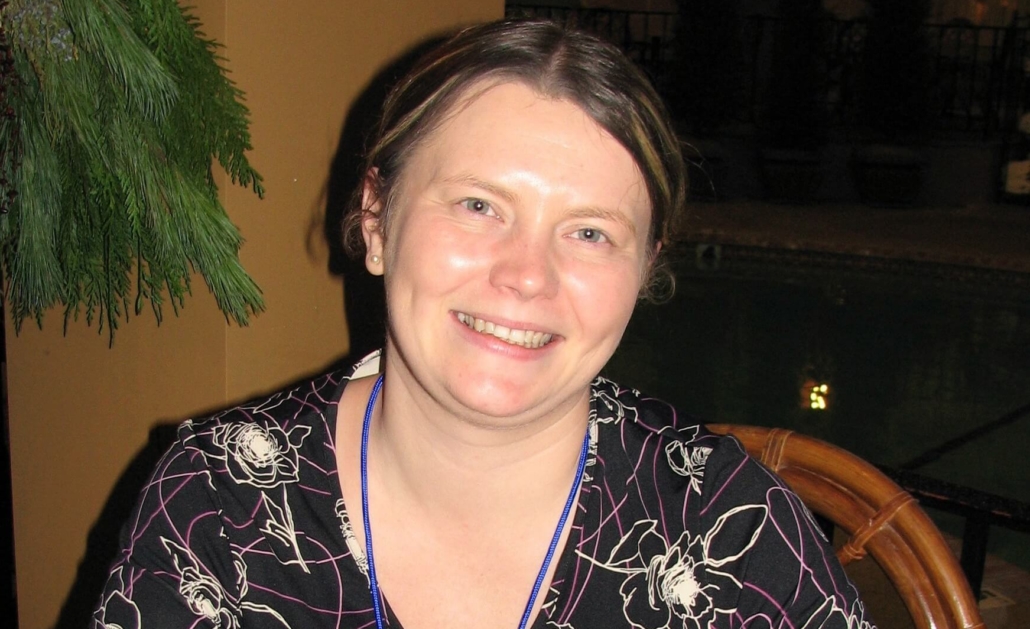
As I head downstairs for breakfast, the halls are filled with students as they prepare for a day at camp. Even if they are not in my class, I know most of the 60 or so students. Just as I have been to camp before, some of the students here have as well. We live side by side, do group activities together, and there is plenty of time to talk in small groups. I have learned that these informal conversations are really instructional (to me as well as the students). They are perhaps as important as our classes. I enter the dining room where the volunteers take all three of their meals each day. The room is already abuzz with volunteers discussing their plans for the day and just enjoying each other’s company. The staff — absolutely wonderful at taking care of us — is busy serving us our morning breakfast. Breakfast always includes fresh fruit, cereal, juice, honey, bread, and often eggs or some dish with Polish roots.

Vounteers in Poland enjoy authentic cuisine at daily meals. 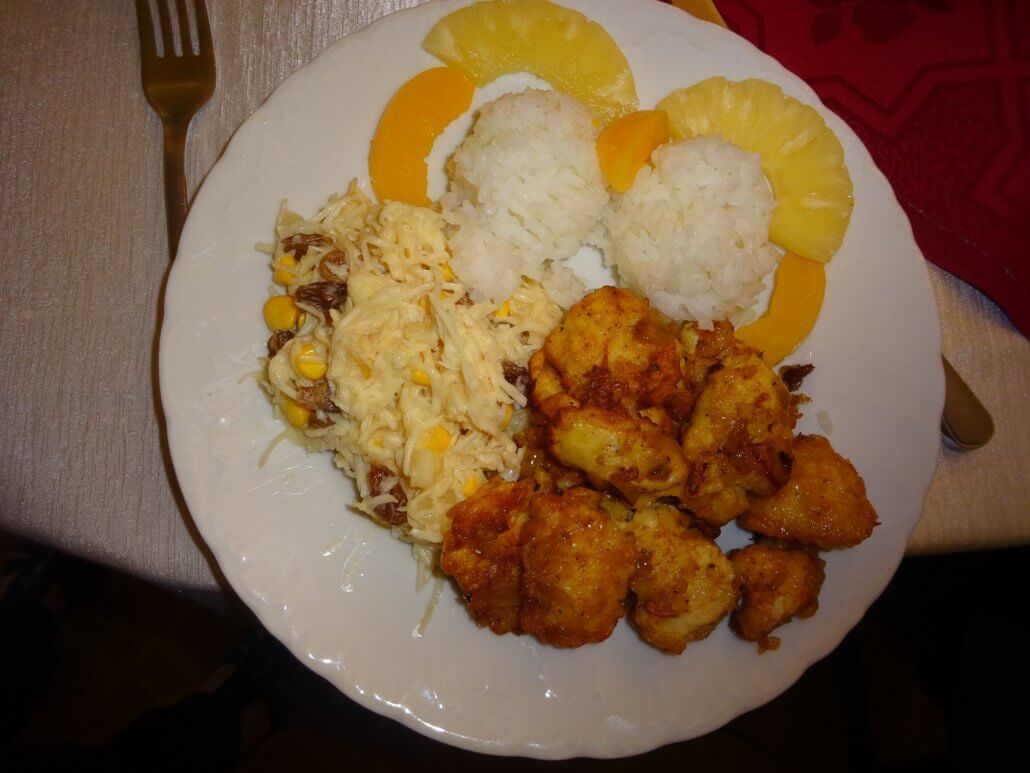
Ken says he eats delicious and balanced meals three times a day at Reymontówka — a special perk of the service program.
As breakfast concludes, we have a team meeting. Dorota directs us as we all detail our activities and make plans for the coming day. I am always amazed at how well Dorota manages our needs during camp. If it is a challenge with a student or just help with travel plans, she always seems to know the answer. We share lesson plan ideas with each other. When the meeting concludes, we all head off to use the 30 minutes or so we have to prepare our classroom area for the first session with our class.
On day one of camp we all choose (and negotiate) where our classrooms will be. I have monopolized a specific corner of a very large event tent most years. I am a creature of habit. Over the next four hours, we will have four periods. Each period will be 45 minutes long. My class typically consists of eight to eleven students. Each year I have had a class of students that have made my time with them special. No matter the challenges, each year I have always wished my time with them could be longer. I tell my class on day one I am here to help them be more comfortable with our language and also for them to enjoy the time at camp. I learned about two years in, as much as anything else, that I wanted to give my students a sense of confidence. They do not need to learn perfect English from me. What they need and want is to be able to converse and understand in our language.
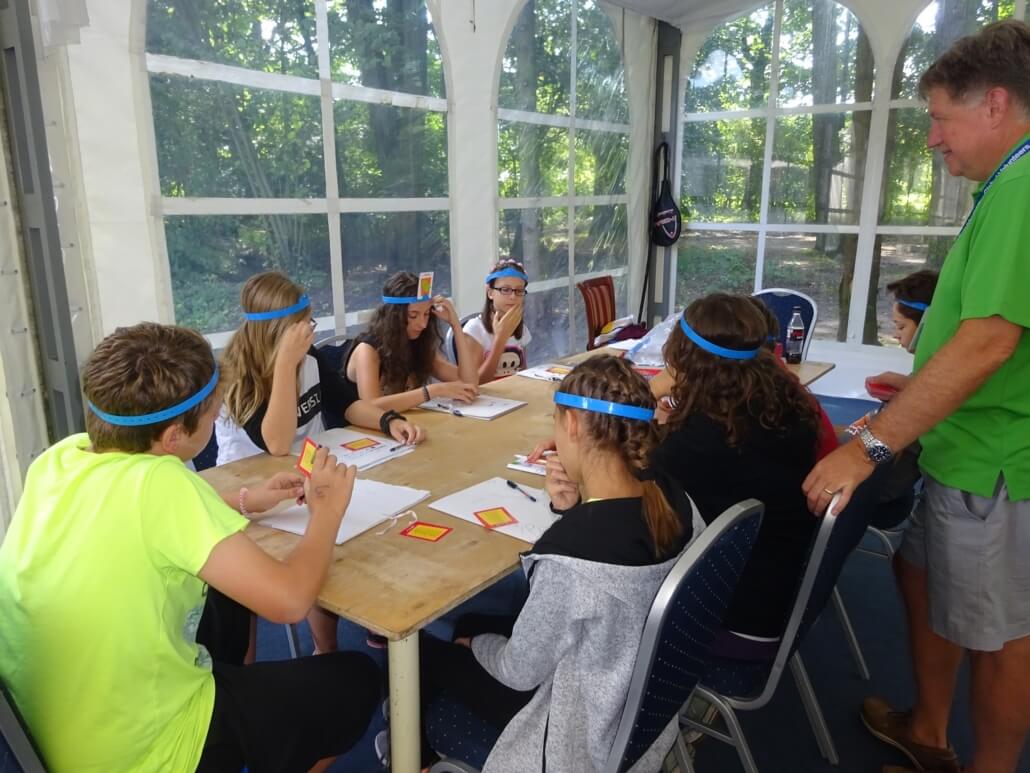
Ken’s goal is to help students become more comfortable and confident with English, not to learn perfect grammar. 
Having contact with native speakers goes a long way in students’ English language learning and confidence.
“No matter the challenges, each year I have always wished my time with them could be longer.”
– Ken Higgins, 4-time Poland volunteer
During classes, I engage the students in activities intended to help them both speak English and understand English as spoken by someone from the States. These activities can range from playing word games to physical activities. I have learned it is also very effective to simply have students talk about themselves or their country — in English, of course. Perhaps today may include the students giving presentations on a famous Pole. Earlier in the week, I break them into teams and they prepare a presentation for the class. Maybe class will include music. Music is a good way to make students comfortable. We may have a scavenger hunt on the grounds. Each day I am always amazed at their eagerness to learn our language. During our fourth period, we often do a group camp activity. Volunteers may give a presentation about where they live. The kids are typically very interested in the U.S.
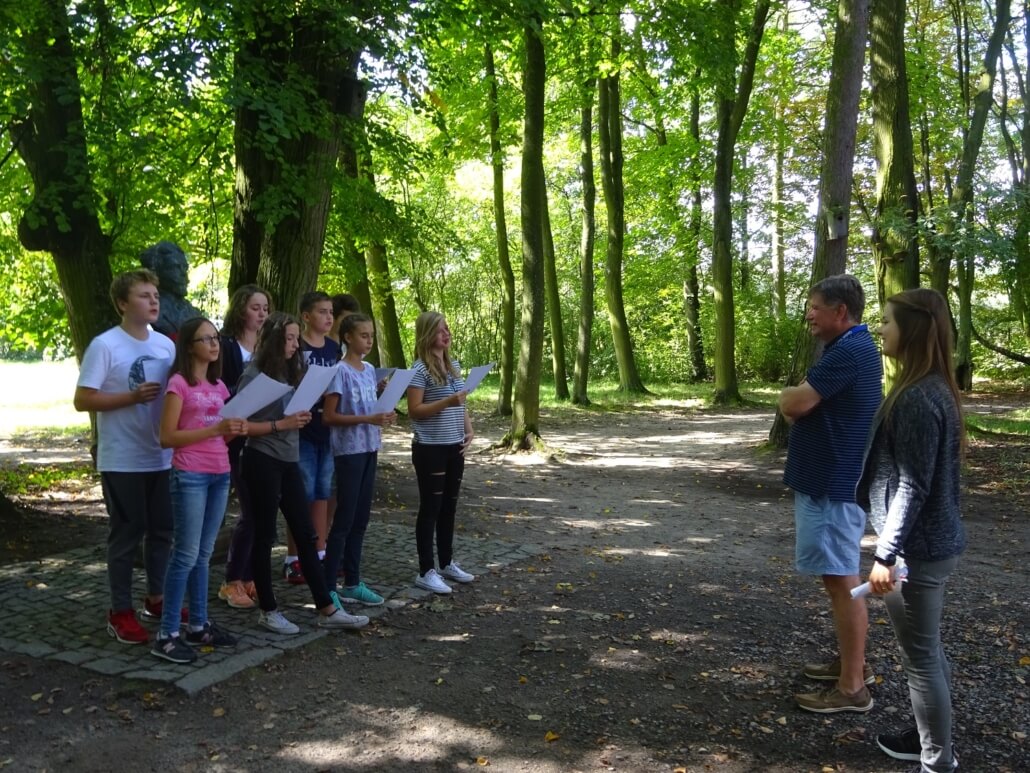
Summer camps lessons are more informal than regular classroom lessons and allow students to practice speaking with native English speakers and gain confidence in their language skills. 
Ken (back, third from left) says that each summer he has been able to work with eager, enthusiastic Polish students.
After fourth period, volunteers gather in the dining room once again to have lunch. Both lunch and dinner always include soup of some kind, which I love. It would be hard for me to choose a favorite meal at camp. After lunch concludes, we have several hours that includes time for lesson planning and free time. We all spend some of this time making a lesson plan for the next day. As we all gather in the resource room to do this preparation, we assist each other. As my fellow volunteers would tell you, I require a great deal of assistance! We are joined by Dorota’s assistant, Marta, who is always assigned to help us with whatever we have needed. Perhaps Marta is scheduled to give us a 20-minute Polish class today. We quickly discover the students learn our English far better than we learn their Polish. We may spend some of our afternoon wandering camp as the kids go about their busy schedules. Usually one day each week Dorota has organized an afternoon outing for us. It could be a trip to a small nearby town rich with its own history. It could be a trip to Siedlce to meet the governor. Poland has always made me feel so welcome and appreciated.
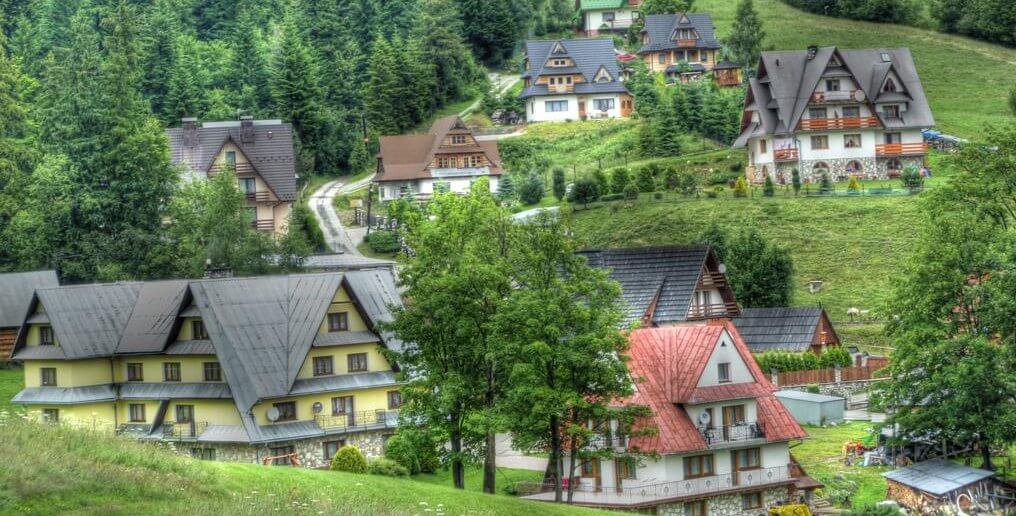
Free time in the afternoons during summer camp afford volunteers the chance to see cultural sites. 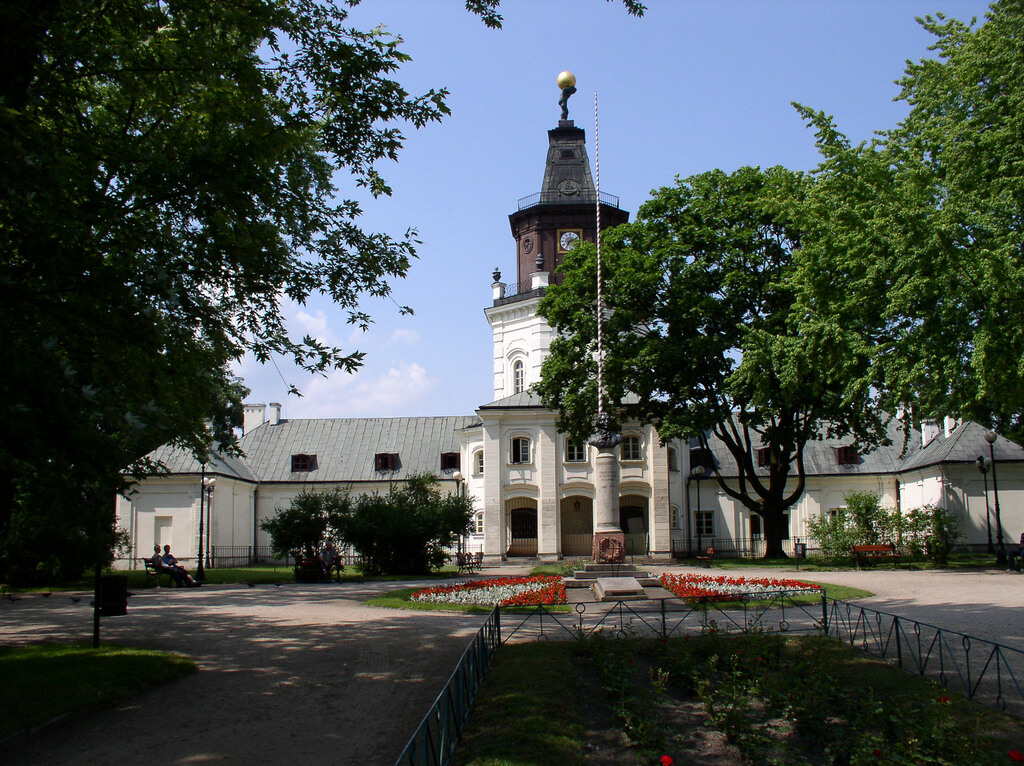
The town of Siedlce in Poland offers beautiful architecture.
As the afternoon comes to an end, we meet once again in the dining room — they are always feeding us here, but it is the two weeks of my year when I eat the most balanced and diverse meals. During dinner, Dorota or her assistant will tell us about the activity the students will be doing this evening. We are always invited to attend and participate. Some are specifically for us, such as Polish Night, when we learn about Poland and sing and dance to Polish music. Tonight could be the fashion show. Kids dress up in various funny outfits. It is always a night of laughter as is the evening of Polish weddings. Kids get married in elaborate ceremonies. These evenings are truly a special part of camp. Perhaps one of the students will sit down on a chair beside us and ask us if they can translate for us. While the students speak English as best as they can during our classes and throughout the day, some of their evening activities are Polish or a mixture of Polish and English. A translator is always welcome!
As the evening activity begins to wind down, most of us head off to our room. We may take a final look at our lesson plan for the following day before settling in for the evening. In my case, I enjoy listening to the volume of camp going from high to low as I lay in bed reading. By ten o’clock, the only sound is a dog barking in the distance occasionally or a giggle from a student who is supposed to be sleeping. It is not uncommon in the quiet of the evening in this small, comfortable room, that I marvel how amazing it is for me to be here with these kids and these people who make this all so special. I drift off thinking about what my students will do for the last evening of camp when we have a show for the parents and family. The day has been such a gift. Tomorrow we will do it again.
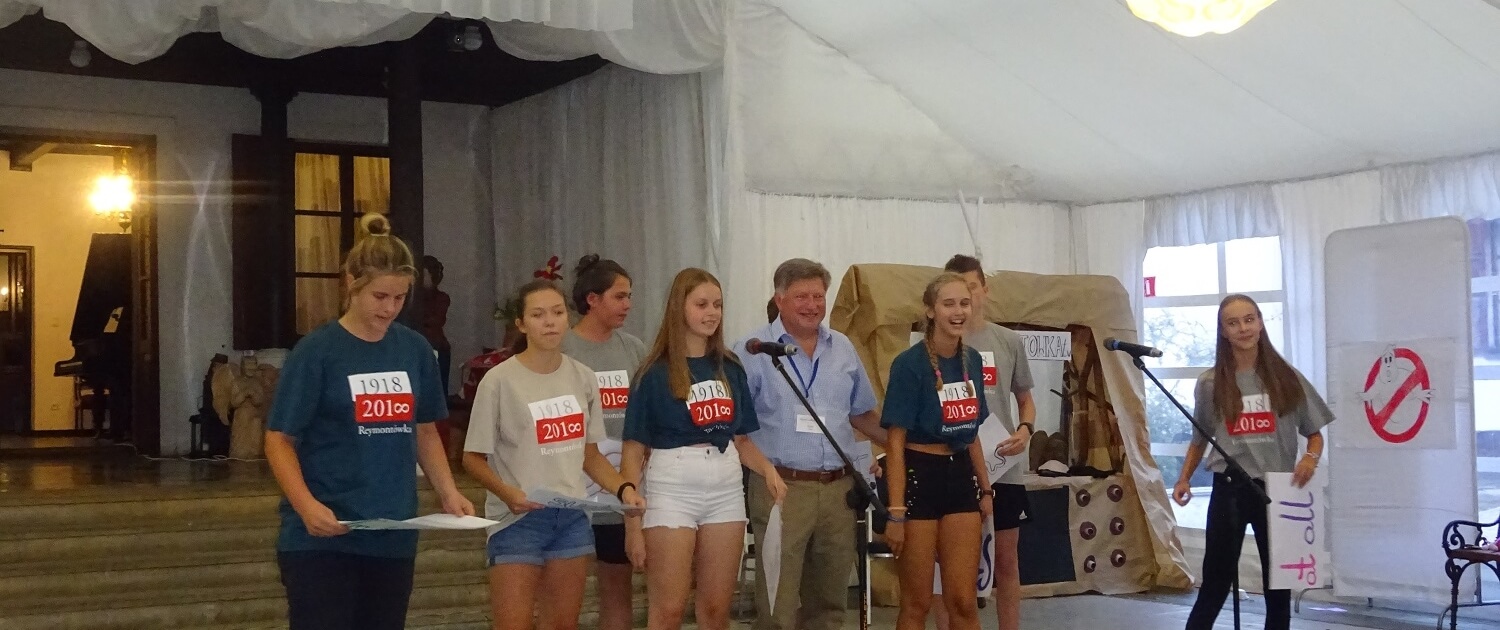
“It is not uncommon in the quiet of the evening in this small, comfortable room, that I marvel how amazing it is for me to be here with these kids and these people who make this all so special. The day has been such a gift.”
– Ken Higgins
The Final Day: When camp begins, it always takes me some time to feel comfortable with my students and I think the same is true for them. But as we spend time together and get to know each other, we form bonds. By the middle of the second week, both volunteers and students are sad to see camp coming to an end. Among our lesson plans, during the last week of camp, we begin to prepare for a show that the entire camp will put on for the families of the students on the final evening of camp. Each class will have about ten minutes to perform. It may be songs the kids sing and there is usually dancing. It could be some kind of short form play. The kids make the decision what they will be doing. Having now had five closing camp nights under my belt, I can say all five have been experiences I will not likely forget. The students have given me heartfelt handmade cards and gifts. We have all hugged and cried together this final evening of camp. Every single time, I have been so proud of my group for their performance. On this night, I always feel so blessed to have met these bright and energetic young people. When our performance concludes, all of us attend an outdoor cookout and we have time to talk with family and friends. The students often get their shirts signed and saying final goodbyes to us and their fellow students and friends. When all of the kids are gone and we are packing to leave camp in the morning, the grounds are so quiet. I already miss the noise and laughter. I hope I have the opportunity to be back in this special place with these special people again.
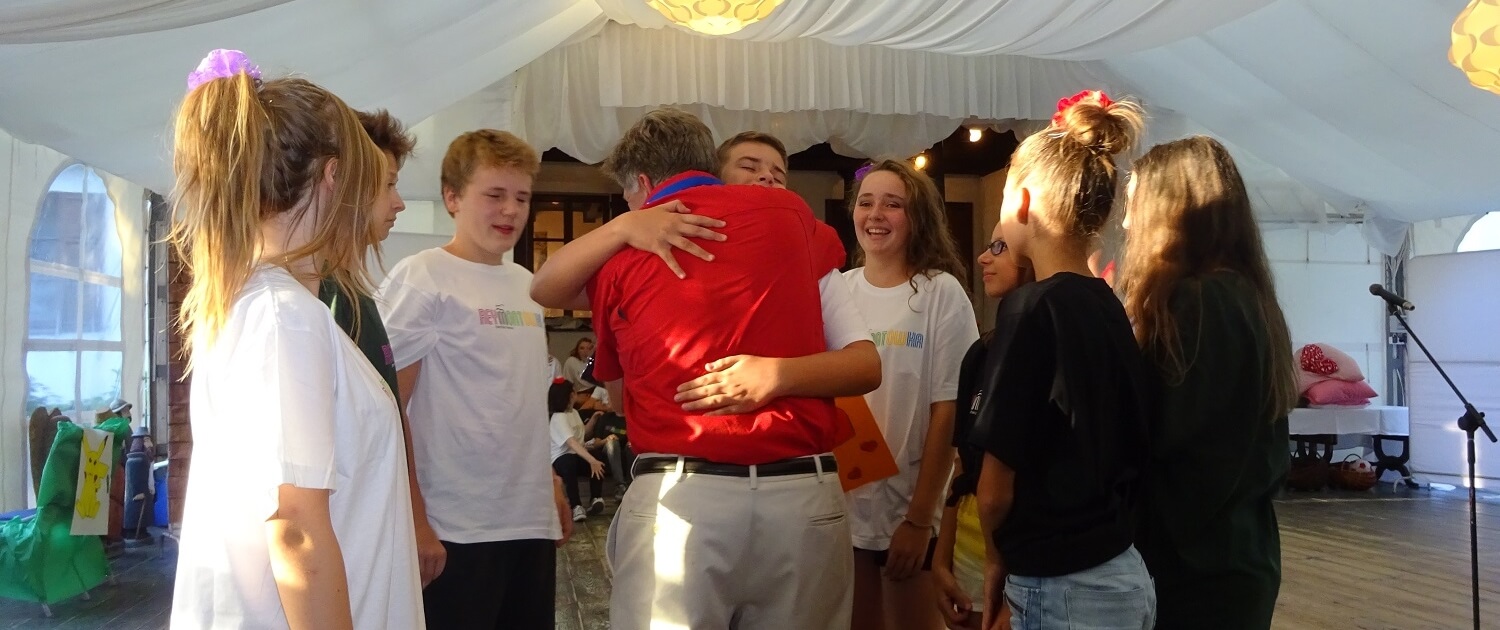
You may also like:

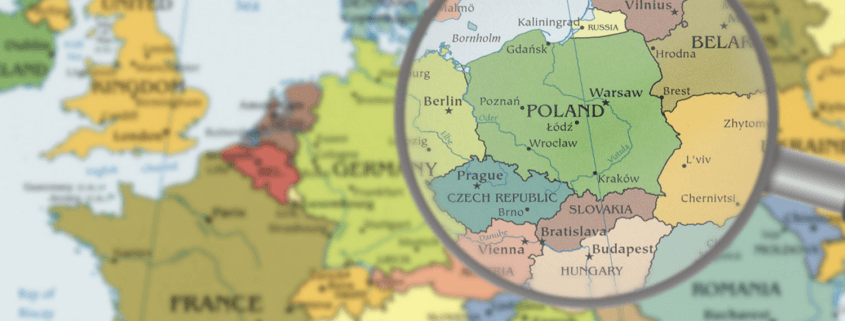


Leave a Reply
Want to join the discussion?Feel free to contribute!